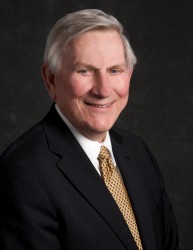Tell Thomas Caskey, M.D., the leading internist in the field of genetics, that you’re impressed by his work, and he will respond with a hearty guffaw: “Don’t be!”
One wouldn’t guess from his self-effacing and affable demeanor that, alongside Nobel Laureate Marshall Nirenberg, he helped prove the universality of the genetic code for living organisms on earth.
But that’s only the beginning of Caskey’s many contributions to genetics. Since his undergraduate years at the University of South Carolina, he’s “had a good time in science,” he says with a slight Southern drawl.
He served 23 years as a professor and research leader at Baylor University in Texas, punctuated by a stint as a faculty scholar at Cambridge University. He left academia to serve as president of the Merck Genome Research Institute. Since 2006, he has served as director and chief executive officer of the Brown Foundation Institute of Molecular Medicine for the Prevention of Human Diseases at the University of Texas Health Science Center in Houston.
Caskey will be the keynote speaker on Wednesday at Florida Genetics 2010, the annual scientific symposium of the UF Genetics Institute. He will discuss efforts to discover genes that cause schizophrenia, including how new sequencing has altered progress, and which genes are high candidates.
During his career, Caskey discovered 11 genetic disease genes — most notably, those for “triple repeat” diseases myotonic dystrophy and fragile X syndrome, the most common form of retardation. From there, he quickly unraveled the phenomenon of “anticipation,” a characteristic of fragile X in which the disease worsens each generation.
But of all the brilliant moments in his career, some of his most treasured memories are from his work with the late Marshall Nirenberg, who received his bachelor’s and master’s degrees in zoology from UF.
“Marshall Nirenberg was very special to me,” he recalled. “We cracked a major problem — no one knew how to get information on the genetic code. We did that. And we did that in an environment with smart young people. He was a great young leader of that lab.”
The experience spurred him to pursue other projects with a fervor matched only by his mentor. He credits the
genetics pioneer with granting him the freedom to explore independently and “an attitude toward science that was embedded in me — that is, to be adventuresome; take on large projects; be dogged in your execution and be careful in observations.”
It was this attitude that compelled him to take a leap of faith and expand his unexpected breakthrough discovery: that the length of the repeat area of a gene determined why a genetic disorder called fragile X syndrome becomes apparent at an earlier age in each proceeding generation—a mechanism known as anticipation. He hypothesized that the same was true of all diseases that exhibit anticipation.
So he pulled three investigators away from another project, asking them to “come take a gamble with me.”
Within five weeks, they had made their discovery.
In his role as director of the Brown Foundation Institute at the University of Texas College of Medicine, he passes on this same dogged determination, tinged with a sense of humor, to young investigators seeking advice when they hit a dead end with their research.
“They’ll come into my office and ask me, ‘Dr. Caskey, what do you want me to do?’ Of course, I’m not asking them to do anything. I have a very rote response: ‘I just wish you to be a famous scientist,’ ” he said. “Set your goals on that. Work on tough projects and make the discovery.”
Caskey has set his own sights on investigating the genes that cause diseases yielding a high morbidity later in life.
“While cancer is certainly a tough one and a high priority, I would say Alzheimer’s, Parkinson’s and schizophrenia have the same priority,” he said. “The morbidity is high and the duration is long. I wouldn’t single out just cancer — we still have these major heavy hitters.”
Caskey is particularly interested in neuropsychiatric diseases because they are increasingly prevalent and lead to lots of bad outcomes. In fact, after Florida Genetics 2010, he will fly to Bogota, Colombia, an area where schizophrenia is extremely common.
In the meantime, he looks forward to visiting UF. He considers conferences like Florida Genetics 2010 something of a “recruitment tool.”
“I will invariably meet someone who is extremely bright who may want to come and work in our research program. Some of the very brightest in my lab have come as consequence of giving a lecture at an institution,” he said. “And the opportunity for collaborative arrangements surfaces out of meeting faculty and looking at programs. If we work together, we can do it. If we work separately, we won’t get it done.”
Caskey will speak at 5 p.m. Wednesday in the auditorium of the Public Health and Health Professions/Nursing/Pharmacy complex on the Health Science Center campus. The public is invited. Call 273-5815 for more information.

